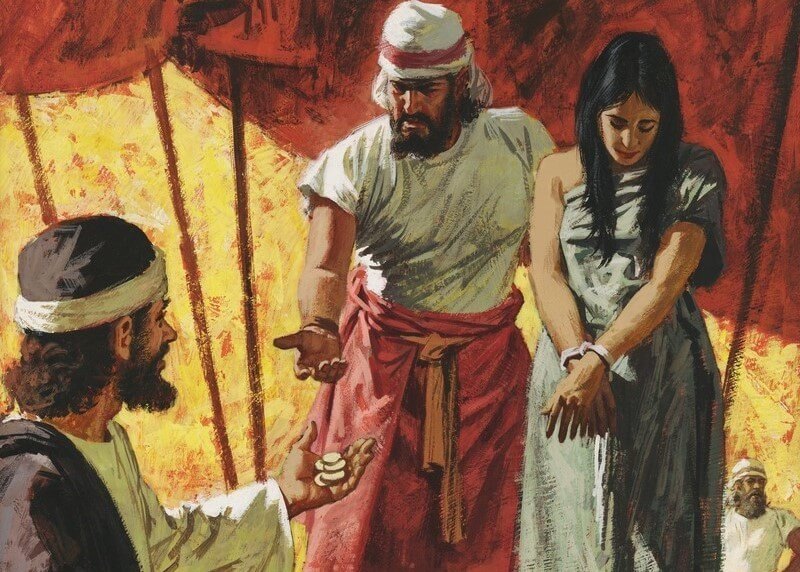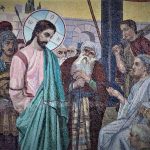Let us return to the Lord: Hosea’s plea
During the 8th century B.C. God sent the prophet Hosea to the house of Israel. Hosea’s mission was to call the people to repent of their idolatry, cruelty, and injustice, and to return to God. His impassioned pleas to this wayward people reflected his own tragic relationship with his wife, who he was trying to bring back from a life of adultery and prostitution. His message is also relevant to us today, as God is still calling people to abandon their godless lifestyles and turn back to him.
Hosea’s history
Hosea lived during the final days of the northern kingdom of Israel when its last kings each reigned only a short time, only to be murdered or captured in battle. The kingdom finally came to an end about 720 B.C. when the Assyrian invasion of Israel was complete.
Surprisingly, God commanded Hosea to marry a promiscuous woman named Gomer, and he took her and her children born through prostitution into his home. Although Hosea was obedient to God as a faithful husband, Gomer continued to engage in adultery during their marriage. Hosea and Gomer later had three children together and their names corresponded to three different prophecies God gave Hosea concerning Israel (chapter 1).
Redemption and deliverance from slavery
At one point in their marriage Gomer left Hosea and returned to prostitution¹. As a result, she apparently sold herself into servitude in return for food and clothing (Hosea 1:5). God then told Hosea to show his love for her again and buy her back from her owner (Chapter 3).
The Lord said to me, “Go, show your love to your wife again, though she is loved by another man and is an adulteress. Love her as the Lord loves the Israelites, though they turn to other gods and love the sacred raisin cakes.” So I bought her for fifteen shekels of silver and about a homer and a lethek of barley. Then I told her, “You are to live with me many days; you must not be a prostitute or be intimate with any man, and I will behave the same way toward you.” (Hosea 3:1-3)
Even though Gomer was actually his wife by covenant, Hosea paid the going price for the loss of a slave (Exodus 21:32), normally 30 shekels of silver, but in this case paying half with silver and the other half with barley. So, he took Gomer back into his home.
God’s indictment against Israel
God used this heartbreaking story to demonstrate a lesson—Gomer’s unfaithfulness to Hosea was an analogy for Israel’s unfaithfulness to the Lord their God.
A person having an adulterous relationship is tantamount to rejecting one’s spouse. The person is saying they no longer value their relationship with their husband or wife. In the same way, the Israelites’ worship of other gods was a rejection of God himself. They abandoned the true Creator God for worthless idols, as Paul wrote in Romans:
…. they became fools and exchanged the glory of the immortal God for images made to look like a mortal human being and birds and animals and reptiles. (Romans 1:22-23)
God’s indictment against the Israelites through Hosea was pointed and hard-hitting:
Hear the word of the Lord, you Israelites, because the Lord has a charge to bring against you who live in the land: “There is no faithfulness, no love, no acknowledgment of God in the land. There is only cursing, lying and murder, stealing and adultery; they break all bounds, and bloodshed follows bloodshed. Because of this the land dries up, and all who live in it waste away… (Hosea 4:1-3)
This was a necessary warning since if they didn’t repent, God would punish them within a few decades by means of the cruel Assyrians. Not only had they rejected their Creator, but they also cast aside all compassion and mercy for others. All the while God sought Israel’s restoration, that she would give up worshipping the gods of the surrounding nations and come back to him in sincere faith. His great love for the people was shown by his patience for them, waiting many years for them to return to him.
Hosea’s plea to return to the Lord
Hosea implored the Israelites to come back to the Lord, and his plea reached a crescendo in Chapter 6:
Come, let us return to the Lord. He has torn us to pieces but he will heal us; he has injured us but he will bind up our wounds. After two days he will revive us; on the third day he will restore us, that we may live in his presence. (Hosea 6:1-2)
Hosea’s emotional plea, “Come, let us return to the Lord” mirrors his desperate plea to Gomer—the woman he married—to abandon her wayward life and return home to live with him as his wedded wife. Her years of unfaithfulness had taken a serious toll on their marriage as well as her own well-being. Yet Hosea still loved her.
This story is a beautiful picture of God’s love for Israel and his willingness to take her back as his own people. But if only they would turn to him in repentance and serve him again.
The fruit of God’s discipline
God disciplines those he loves, as a father disciplines his children when they go wrong. His discipline is never enjoyable, but it bears lasting fruit. And it’s for our good—it’s because he loves us that he strikes us. After God’s discipline is complete and has done its job, he then heals our wounds. He cleanses us and restores us to spiritual and emotional health so we can live again in his presence.
God desires for people to turn to him that they might be restored: restored to fellowship with him, to live free from addictions and destructive lifestyles, and to be all that we were created to be. God’s restoration through Christ is a great relief when it comes. He revives his life within us and renews our ability to love. We are truly free when we’re under his care and protection. But as Jesus taught, those who commit sin become enslaved by it (John 8:34), just as Gomer was.
Hosea a type of Christ
The parallels between Hosea and Christ are many. Hosea’s purchase of Gomer from slavery was also a picture of our redemption, when Christ bought us back from the slavery of sin.
But in our case, Christ himself was the ransom payment for our freedom. He sacrificed his own life on the cross to purchase us back from Satan’s dominion. This is why we say that Hosea was a type of Christ. He demonstrated the redemption and restoration that Christ accomplished for us when he died and rose again. Jesus temporarily became a slave for us, and it was no coincidence that the earthly price with which his life was valued during his betrayal was also 30 shekels of silver (Matthew 26:14-15), equal in value to what Hosea paid to redeem Gomer.
Hosea’s plea to seek and know the Lord
Hosea implored the people to seek God and acknowledge him—as their only Lord, Savior, and hope.
Let us acknowledge the Lord; let us press on to acknowledge him. (Hosea 6:3)
Throughout the Bible, there are countless commands and admonitions to seek the Lord. And God’s promise was that if we do, he would reveal himself to us and we would know him. God is near to those who seek him, as he is not far off, but delights in revealing himself to those who do so. When we press on to know the Lord, he comes to us as promised, just as Jesus promised the Laodicean church:
Those whom I love I rebuke and discipline. So be earnest and repent. Here I am! I stand at the door and knock. If anyone hears my voice and opens the door, I will come in and eat with that person, and they with me. (Revelation 3:19-20)
God’s promise of blessing
God’s promise of blessing is sure and guaranteed:
As surely as the sun rises, he will appear; he will come to us like the winter rains, like the spring rains that water the earth. (Hosea 6:3)
Rainfall occurs in Israel from October through the winter into the following April. The moisture comes from the Mediterranean Sea, producing about 20 inches of rainfall per year in the central coastal plains. The “autumn rains” mentioned in the Bible were essential for plowing, while the “spring rains” were essential for reaping a good harvest. Both were important for a good produce from the land as implied in Deuteronomy 11:13-14.
God’s promise was that he would come to the people and bless them like the winter rains bless the land. They would be blessed with his presence, protection, and salvation—if only they would return to the Lord with real faith and sincere devotion.
God’s rebuke
God’s exasperation with the people of Israel came to a head in Hosea 6:4.
What can I do with you, Ephraim? What can I do with you, Judah? Your love is like the morning mist, like the early dew that disappears. (Hosea 6:4)
The name of Ephraim, Israel’s largest tribe, was often used when speaking of the whole people of the Northern Kingdom. During the dry season from May to September there was no substantial rain or runoff that they could use. The only moisture was from the dew which occurred in the morning. But as soon as the sun came up the dew dissipated.
Judah and Israel had committed gross sin against the Lord and violence against their fellow Jews. They still had not banished idol worship from the land. And then they would come to the temple with sacrifices and offerings to appease God and to gain his favor. Their love for him was like mist in the morning that disappeared as soon as the sun rose. It was shallow religion without substance that disappeared at the slightest nudging.
Therefore I cut you in pieces with my prophets, I killed you with the words of my mouth—my judgments flashed like lightning upon you. (Hosea 6:5, NIV 1983)
God’s words spoken through the prophets were like swords that cut deep and kept cutting until the people were bloodied and beaten. But they still didn’t listen to return to the Lord.
God’s word is sharper than a two-edged sword (Hebrews 4:12) and his discipline is effective. He tears apart our false gods, false securities, and adulterous behavior. If we listen and obey his word, we will find healing. But if we continue to refuse his correction, his judgement can be harsh.
God’s heart
God’s greatest desire was for the people to truly love him from the heart. But they had to abandon the gods of the surrounding nations and acknowledge that the Lord is the true and only God. And this love for God was to be shown by their love for others and by extending a hand of mercy to their neighbors.
For I desire mercy, not sacrifice, and acknowledgment of God rather than burnt offerings. (Hosea 6:6)
Until they sincerely desired to return to the Lord, he would have none of their animal sacrifices—he would not accept them. Their worship was like the mist: appearance without substance.
Jesus and Hosea 6
Mercy and sincere desire for the knowledge of God were also central to Jesus’ teaching. Jesus quoted Hosea 6:6 twice in the gospels.
While Jesus was having dinner at Matthew’s house, many tax collectors and sinners came and ate with him and his disciples. When the Pharisees saw this, they asked his disciples, “Why does your teacher eat with tax collectors and sinners?” On hearing this, Jesus said, “It is not the healthy who need a doctor, but the sick. But go and learn what this means: ‘I desire mercy, not sacrifice.’ For I have not come to call the righteous, but sinners.” (Matthew 9:10-13)
Jesus applied Hosea’s message to the people and religious leaders of his day. These leaders had also practiced a superficial religion without substance, similar to the priests of Hosea’s time, looking down on others and ignoring their need for forgiveness and restoration. The Pharisees also criticized the disciples for picking grain on the Sabbath. Jesus’ response to them was to again quote Hosea:
If you had known what these words mean, ‘I desire mercy, not sacrifice,’ you would not have condemned the innocent. For the Son of Man is Lord of the Sabbath.” (Matthew 12:7-8)
The Pharisees were much more concerned with the strict keeping of the Sabbath than a true and consistent love for God and for others. In their pride and arrogance, they condemned innocent people for living their normal lives and doing things on the Sabbath that were not prohibited by God’s law. But God is much more concerned with our love for him and our treatment others than our outward ceremonial worship.
Applying Hosea’s message: returning to God today
Hosea’s words ring throughout the pages of history and confront each new generation. Each must grapple with the words of the Lord.
Does his message resonate with you? Does it speak to the religious group you associate with? If so, then God’s command is the same: abandon your waywardness and return to the Lord. Give up your pretentious worship and in repentance give him the true heartfelt worship that he deserves. Discard the sins that keep you from a close walk with God and seek him with a sincere heart.
Just as Hosea’s wayward wife returned to him, return to your Creator and give him the love that he desires.
¹Some commentators believe that the story in Hosea chapter 3 is a repeat of the story told in chapter 1. But the traditional interpretation is that Hosea married Gomer who had already been a prostitute. Later she turned again to prostitution, after which he bought her back.
Christ in Scripture is listed on Feedspot Top 200 Christian Blogs.







2 thoughts on “Let us return to the Lord: Hosea’s plea”
This truly is an outstanding example to illustrate what the Northern Kingdom had done, and just how disloyal they were; contrasted with God’s abundant willingness to forgive.
How stubborn, defiant and arrogant were the Israelites to God and yet God forgave them every time and continually sent his prophets to instruct them to turn away from their evil ways. God is love!